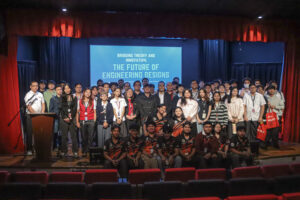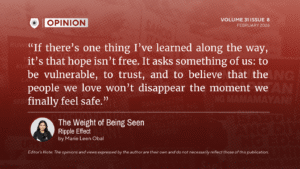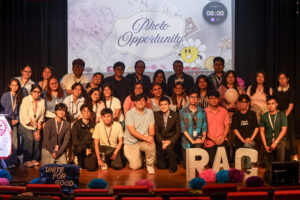Written By Chloe Nicole M. Quintela | October 18, 2025

Graphic Art by Alisandra Untalan
The Authenticity Trap: Behind the Matcha Runs and Tote Bags Fixation
A Gen-Z walks into a café, a tote bag slung over their shoulder, along with anik-aniks swinging in every step. They order a matcha latte with oat milk, claim a seat by the window, and pull out a well-known feminist book. Wired earphones trail from their pocket, an odd choice over the hyped-up AirPods, as Clairo and Laufey fill the quiet space in between sips.
At first glance, it may seem like a simple cafe run. But in today’s generation, acts like this rarely exist without meaning. The matcha oat latte, indie song fixation, and anik-anik — it all blends into something that is tagged as performative rather than self-expression.
The Strange Shift
Since the 90s, men and women have been showered with stereotypes — how men are expected to be strong, play sports like basketball or boxing, lift weights at the gym, and take on hands-on or leadership roles that are considered “masculine.” In contrast, women are expected to be soft-hearted and nurturing. These unwritten rules have long dictated not only how people behave but also how they are perceived in society.
This mindset is heavily embedded in Filipino culture, rooted in Spanish colonization, affecting the perception of gender in line with religion and Western beliefs, leaving Filipinos to believe that men are portrayed as providers, while women are seen merely as domestic. In clothing, men are pushed toward clothing that highlights authority and strength, such as tailored shirts, suits, and neat collars. Women, on the other hand, are nudged into outfits that emphasize softness and femininity, like dresses, skirts, frilly blouses, and maybe a bit of lace or ruffles here and there, but nothing too revealing for the sake of being “proper and decent.”
However, not so long ago, the youth started protesting against these gender stereotypes, rallying about how people should not fall for those molds of what men or women “should” be. For years, social media has become the platform for voicing out gender equality. It was a movement built on authenticity, encouraging people to embrace who they truly are without fear of judgment.
But how come that same generation tags men who like drinking matcha as performative?
Performative Paradox
In a world where identity is always on display on social media, the line between self-expression and performance has become blurry. What you wear, what you order, and even what you read, are now open for judgment.
How ironic it is that, in hopes of escaping the toxic stereotypes of the past that it continually fights off, that same youth ends up creating new ones? Sipping matcha, listening to indie artists, and going to the gym were once random personal choices, but they have now transitioned into the performative male starter pack. Instead of being celebrated as normal expressions of taste, they are scrutinized under the lens of whether someone is authentically into it or simply performing for validation.
When people are free to explore interests, aesthetics, and hobbies without fear of ridicule, self-expression becomes exactly what it should be: personal, fun, and authentic.
“Let Them” Mindset
Maybe the real solution to this is not to police every action or clothing that seems odd, but to actually internalize that “let them” mindset. Let people enjoy what they enjoy, and let them express themselves in ways that they want to, because not everything has to be a statement or a performance; sometimes, it is simply what feels right to them. Besides, a guy reading literature in a coffee shop does not automatically need a manifesto.
Let’s face it, all of us are performative because, at the end of the day, we are all still trying to find the most authentic and best version of ourselves. Authenticity is not about proving originality. Perhaps it is about doing things that make you, you – even if it is similar to others. In the end, it is not uniqueness that defines authenticity, but honesty and the courage to be yourself without needing anyone’s approval.
Volume 31 | Issue 4



